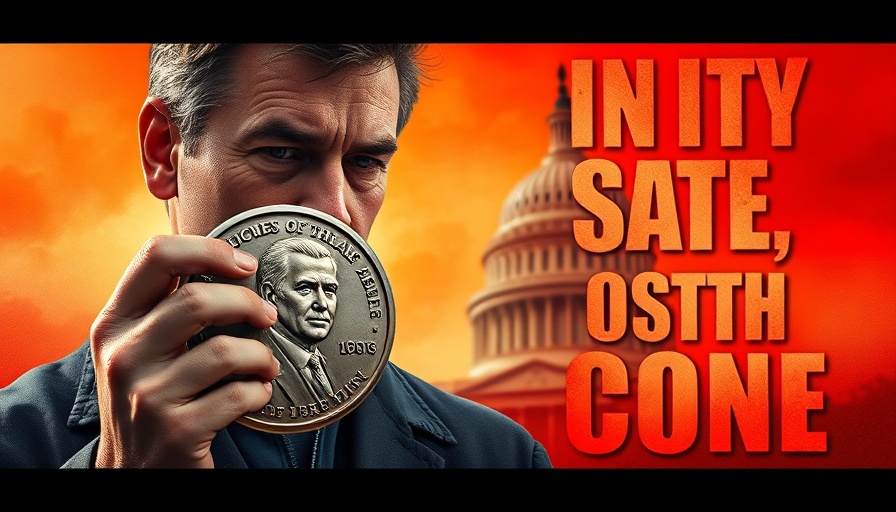
How Trump's Crypto Dinner Is Shaping Stablecoin Legislation
In the world of cryptocurrency, events can shift paradigms overnight—an unpredictability that is both thrilling and perilous. Recently, the concept of a dinner with former President Donald Trump for the top holders of his Trump memecoin has sparked controversy, highlighting a potential collision between cryptocurrency ambitions and regulatory processes in the U.S. This article explores how Trump's intertwining with the crypto landscape could reshape legislation, causing ripples throughout the entire market.
In Trump’s $1.4M Crypto Dinner & The Collapse of Stablecoin Legislation, the discussion dives into the intersection of cryptocurrency and politics, exploring key insights that have prompted deeper analysis on our end.
The Genesis of the Genius Act
The past months have seen significant movements in U.S. cryptocurrency legislation. The introduction of the Guiding and Establishing National Innovation for US Stable Coins Act, abbreviated as Genius, sought to lay a foundational framework for stablecoins. With bipartisan support from politicians such as Democrat Kirsten Gillibrand and Republican Cynthia Lummis, the Genius Act defines stablecoins as digital assets pegged to the dollar. This act could potentially regulate smaller issuers at the state level while handing larger entities over to federal scrutiny.
This framework is a welcomed step towards clarity. However, the discussions were tempered by warnings, particularly from opponents like Senator Elizabeth Warren, who argued that the act could jeopardize consumer safety and potentially facilitate illegal financing—raising alarm bells amidst growing political tensions.
The Impact of Trump's Involvement
The dinner invitation for memecoin holders reflects not just the novelty of cryptocurrency but raises substantial ethical questions about President Trump's financial interests in the crypto domain. Representative Maxine Waters voiced concerns that Trump's associations with various crypto projects, including World Liberty Financial, where his family is involved, may undermine fair governance and financial integrity.
The implications of Trump's dinner are twofold. Firstly, it could leverage his influence to garner financial capital into the crypto space. Secondly, it raises scrutiny among legislators about the ethical conflict arising from incentivizing contributions to political figures through access to lucrative crypto initiatives.
Current Legislative Landscape: What’s Next?
The trajectory of the Genius Act is now fraught with challenges. With Democrats withdrawing their support amidst concerns about Trump's crypto attachments, the act's progression remains uncertain. A key highlight is the call from certain lawmakers for additional hearings to address deeper issues surrounding the foundation laid by the Genius Act and the implication of foreign financial influences.
Opposing factions arise in the market too, as senators advocate for regulations concerning yield-bearing stable coins that could further disrupt existing financial institutions. In a rapidly evolving situation, the ability of a bipartisan resolution to emerge seems tenuous.
Trump’s Memecoin Dinner: A Reflection of Market Sentiment
The trending meme culture in crypto, illustrated by the potential for dinner tickets to fetch over a million per plate, exemplifies the hype-fueled volatility that characterizes today’s market. Investors seem split between a rush to capitalize on speculation versus a cautious approach built on regulatory foundations.
However, the pushback against Trump's dinner has begun to resonate through the crypto community. Concerned voices within and outside the political sphere highlight the danger of encroaching financial elitism tainting broader crypto adoption. This is a crucial moment for crypto governance—how Congress handles the surrounding dynamics may well set the tone for future crypto regulatory frameworks.
What the Future Holds for Crypto Legislation and Market Integrity
Looking ahead, the challenge lies in balancing innovation with ethical governance. The call for lawmakers to navigate the intricacies of digital asset protocols comes at a time when the market is rife with speculation about security, transparency, and growth prospects. Additionally, the SEC’s recent stance that dollar-backed stablecoins are not securities indicates a potential breathing space for innovation but also leaves room for more fraud detection mechanisms that will shape investor confidence.
While fears linger regarding the implications of Trump's dinner and the potential prioritization of his interests over national or global economic health, the call for collaboration between political factions presents a unique opportunity for robust legislation to emerge. If Congress is willing to embrace potential compromises, it could pave the way for more holistic and stable governance for cryptocurrencies, facilitating the future of financial technologies in the U.S.
Conclusion: A Call for Vigilance
This ongoing saga of Trump's crypto connections not only underscores the significance of stablecoin regulation but also indicates how closely entwined politics and finance have become. The crypto community must remain vigilant, advocating for transparent regulations that safeguard innovation while upholding the public trust. As developments unfold, keeping a pulse on these regulations provides deeper insights into the trajectory of both cryptocurrency markets and broader economic environments.
If you wish to delve deeper into the intricacies of cryptocurrency and stay tuned with the latest market updates, the Coin Bureau is an excellent resource for comprehensive educational webinars, expert interviews, and thorough market analyses. Consider subscribing for insightful content that empowers your understanding of the crypto galaxy!
 Add Row
Add Row  Add
Add 




 Add Row
Add Row  Add
Add
Write A Comment